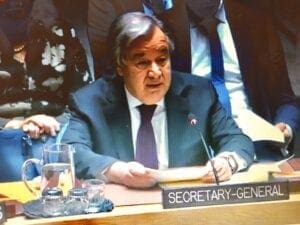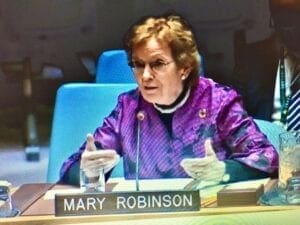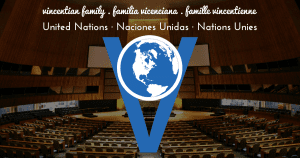 UN Secretary General, Antonio Gutteres, and Former President of Ireland, Mary Robinson. both appealed for greater international collaboration during a January 9th United Nations Security Council debate entitled, ”Upholding the United Nations Charter to Maintain International Peace and Security.” Representatives from other nations echoed their sentiments.
UN Secretary General, Antonio Gutteres, and Former President of Ireland, Mary Robinson. both appealed for greater international collaboration during a January 9th United Nations Security Council debate entitled, ”Upholding the United Nations Charter to Maintain International Peace and Security.” Representatives from other nations echoed their sentiments.
“At this time of global divisions and turmoil, the (UN) Charter remains our shared framework of international cooperation for the common good,” Guterres said. “In an era of spreading hatred and impunity, the Charter reminds us of the primacy of the rule of law and human dignity.”
UN Charter values include the peaceful settlement of disputes; the equal rights of men and women; non-intervention, self-determination and the sovereign equality of Member States; and clear rules governing the use of force. When such principles are ignored, contravened, or applied selectively, the Secretary General noted, the result has been conflict, chaos, death, disillusion and mistrust.
“International cooperation is at a crossroad,” said Guterres in his briefing. “Peace is the essence of UN work and all that we strive for as a human family depends upon peace,” he commented.
The Secretary General gave a sobering account of the opening days of 2020.
“Unfortunately, the new year has begun with fresh turmoil and long-standing suffering,” Guterres said. “ Geopolitical tensions have reached dangerous levels, most recently in the Gulf, as well as from traditional military threats to the economy to cyberspace. Conflicts that no one is winning grind on and on and on, from Libya and Syria to Afghanistan and the Sahel.”
“With turbulence on the rise, trust within and among nations is on the decline,” Guterres continued. “We see this trust deficit also in streets across the world, as people vent their frustrations and voice their feeling that political establishments are out of touch, incapable or unwilling to deliver. We see it in the work of the United Nations, including the Security Council, when Member States struggle or fail to find reasonable common ground. And in this vacuum, the climate crisis is now upon us with ever-growing fury, sparing no one.”
The Secretary General noted that the Charter, its purposes and principles remain as relevant as ever, but tools must adapt to new realities. “And we must use them with greater determination and creativity,” he said. “One of the most effective ways to demonstrate our impact is to invest in (conflict) prevention.”
“We spend far more time and resources managing and responding to crises than on preventing them.” Said the Secretary General. “Our approach needs to be rebalanced.”
“The privilege of membership carries vital responsibilities to uphold the Charter’s tenets and values, particularly in preventing and addressing conflict,” Guterres said. “Present and past disagreements must not be an obstacle to action on today’s threats. We must avoid double standards. But also, perceptions of double standards must not be an excuse for no standards at all.”
 Mary Robinson, Chair of The Elders, an independent group of world leaders committed to peace, justice, and human rights), said that the world faces two distinct existential threats: nuclear proliferation and the climate crisis.
Mary Robinson, Chair of The Elders, an independent group of world leaders committed to peace, justice, and human rights), said that the world faces two distinct existential threats: nuclear proliferation and the climate crisis.
“Responding to these threats is critical, but made harder at a time when multilateral co-operation is being undermined by populism and nationalism,” she said.
Robinson pointed out that multilateralism is in leaders’ own national interest and that cooperation by internationally-agreed mechanisms are less costly and more reliable that unilateral force.
“Such an approach is not only needed in order to tackle the climate crisis and nuclear proliferation, but also crucially important in addressing the alarming escalation of tensions across the Middle East – Iran, Palestine, Libya, Syria and Yemen to name but a few,” she said.
“The gravity of the current situation in the Middle East means that dialogue and negotiations are urgently needed,” the former Irish President told the Security Council, “and I urge the Representatives in this room to consider what the UN can do to bring them to the table in the spirit of its Charter.”
In terms of nuclear issues, Robinson called for nuclear powers to “get serious” about disarmament and to pursue policies of nuclear minimalization. She further called for a reenergized Nuclear Non Proliferation Treaty
With regard to the climate crisis, Robinson referred to the disappointing outcome of COP 25 held in December in Madrid. The Elders call for a bold new initiative, she said. In example, she mentioned the need for creative ideas such as a Fossil Fuel Non Proliferation Treaty.
“We need a new mindset that recognises the urgency of the challenge the IPCC (Intergovernmental Panel on Climate Change) posed in its report on warming at 1.5˚C,” Robinson said. “New ideas borne from a shared understanding that we need to reduce global carbon emissions by 45% by 2030 and be carbon neutral before 2050.”
“The Security Council should be a key player in shaping this new mindset,” she said. “But, unfortunately, it is seen by many as not being fit for purpose.”
“Too many members, not least those with the special responsibility of holding Permanent Seats,” Robinson observed, “treat it as a forum for advancing their own narrow interests rather than a means of addressing common challenges.”
Mrs. Robinson further asked that the Security Council give priority to systemic violence and discrimination against women and girls. She called upon the Council to implement numerous resolutions dealing with gender inequality.








thanks for reminding us of the possibility and wisdom of peaceful settlement of disputes!
A hopeful vision for 2020
Thank you Margaret. We remain hopeful.